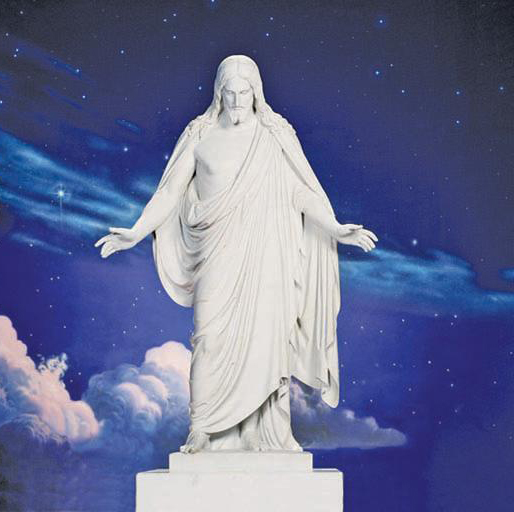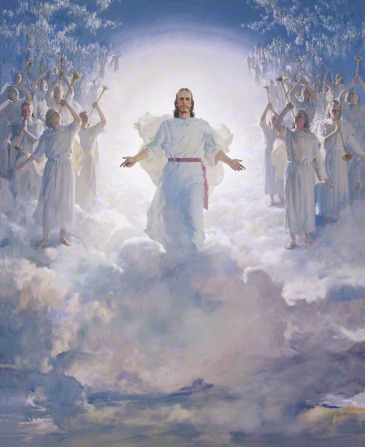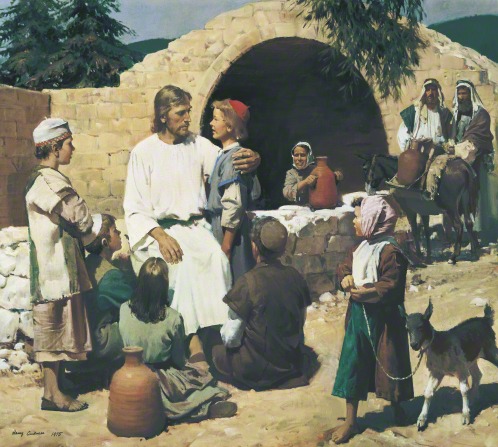Mormon doctrines and beliefs are centered on Jesus Christ and Heavenly Father’s plan for His children.
The fundamental principles of our religion are the testimony of the Apostles and Prophets, concerning Jesus Christ, that he died, was buried, and rose again the third day, and ascended into heaven; and all other things which pertain to our religion are only appendages to it (History of the Church, 3:30).
~ Joseph Smith, founding prophet
Heavenly Father’s plan answers the questions about where we came from, why we’re here and what happens when we die. We are all spirit children of God and lived with Him in heaven before we came to earth. We wanted to be like Him and live as He does, but we were not yet prepared to do so. We came to earth to receive a physical body, knowing that we would not remember our home in heaven. Our time on earth was to learn, grow, progress and be tested to see if we would follow the commandments of God. This was the only way that we could qualify ourselves to return to the presence of God and live as He does. But in the course of our mortal journey, God knew that we would sin, cutting ourselves off spiritually from God. As mortals, we would also be subject to physical death.
Heavenly Father provided a way to overcome these barriers through the Atonement of His Son, Jesus Christ, which includes the Resurrection. Thus, Christ is the central figure in this plan. All of the other doctrines and principles of the gospel are appendages to these truths.
The Plan of Salvation
We are all spirit children of our Heavenly Father. We lived with Him in heaven before we were born and desired to be like Him—a perfected, resurrected being with a body of flesh and bone. The Church of Jesus Christ teaches,
God is the Father of our spirits. We are literally His children, and He loves us. We lived as spirit children of our Father in Heaven before we were born on this earth. We were not, however, like our Heavenly Father, nor could we ever become like Him and enjoy all the blessings that He enjoys without the experience of living in mortality with a physical body.
God’s whole purpose—His work and His glory—is to enable each of us to enjoy all His blessings (Preach My Gospel, 2004, 48).
To become as He is and enjoy all of His blessings, we would have to qualify ourselves by choosing to obey His commandments. It was likely relatively simple to obey His commandments when we lived in heaven. But that was not enough. We would have to be born into mortality, into a fallen world, with no memory of our heavenly home nor what we learned there, and still choose to obey His commandments in all things.
Our agency—our ability to choose and act for ourselves—was an essential element of this plan. Without agency we would be unable to make right choices and progress. Yet with agency we could make wrong choices, commit sin, and lose the opportunity to be with Heavenly Father again.
~ Robert D. Hales, Quorum of the Twelve Apostles
A Brief Outline of the Plan of Salvation
The main points of the plan of salvation are:
- The earth was created as a place for us to learn and progress.
- Because of the fall of Adam and Eve, we are physically separated from God.
- Through our sins, we are spiritually separated from God.
- Physical death is the separation of our spirits from our physical bodies.
- Jesus Christ is the Savior and Redeemer because He performed the Atonement to overcome the barriers that separate us from God.
- Jesus Christ also broke the bands of death through His Atonement, which means that our spirits and bodies will be reunited during time of the Resurrection.
- Our eternal destination will depend upon our choices. Rather than being strictly a heaven or hell, there will be degrees of glory that we can obtain.
- The plan of salvation includes all of the doctrines, covenants, ordinances and teachings that will lead us back to the presence of God.
The Importance of Agency
Why is agency, or our ability to choose for ourselves, so important to the plan of salvation? Agency isn’t just part of the plan, it is the plan.
The purpose of mortal life for the children of God is to provide the experiences needed “to progress toward perfection and ultimately realize their divine destiny as heirs of eternal life.” As President Thomas S. Monson taught …, we progress by making choices, by which we are tested to show that we will keep God’s commandments (see Abraham 3:25). To be tested, we must have the agency to choose between alternatives. To provide alternatives on which to exercise our agency, we must have opposition.
~ Dallin H. Oaks, First Presidency
Opposition means opposing forces—light and dark, health and sickness, pleasure and pain, bitter and sweet. How are we to choose if there is but one option?
A life without problems or limitations or challenges—life without “opposition in all things” … —would paradoxically but in very fact be less rewarding and less ennobling than one which confronts—even frequently confronts—difficulty and disappointment and sorrow.
~ Jeffrey R. Holland, Quorum of the Twelve Apostles
Ennoble is an important word here.
Ennoble: to elevate in degree, excellence or respect: dignify; exalt
Our Heavenly Father sent us here to ennoble us. And it is through opposition that He does so. Sometimes the opposition comes from our own choices, sometimes from the choices of others, and other times just because we live in a fallen world. It is how we choose to respond to this opposition that will either dignify and exalt us or bring us down. It is, indeed, the test of this mortal life. It was also the test of our premortal life. Heavenly Father did not send us here without our permission. We chose to follow His plan.
The Fall of Adam and Eve
Latter-day Saints believe the power of choice is so important that even our first parents, Adam and Eve, had to choose to leave the presence of God and the Garden of Eden. And they had to do so without the knowledge of our pre-earth life.
Adam and Eve were created in God’s image with bodies of flesh and bone. While in the Garden of Eden, they were still in the presence of God and could have lived there forever. They could not progress, and they could not have children. They did, however, have their agency. Heavenly Father commanded them to not partake of the fruit of the tree of knowledge of good and evil, which was the forbidden fruit. Satan provided the opposition by tempting them to eat the forbidden fruit.
They were given the choice either to remain in the garden or to partake of the fruit of the tree of knowledge of good and evil and have the opportunity of experiencing mortality. They accepted the challenge, partook of the fruit, and thus became mortal and subject to physical death. Because of their choice, they would experience all of the trials and difficulties of mortality.
~ L. Tom Perry, Quorum of the Twelve Apostles
Some people have criticized Adam and Eve for this choice. But Latter-day Saints believe this was part of Heavenly Father’s plan.
For reasons that have not been revealed, this transition, or “fall,” could not happen without a transgression—an exercise of moral agency amounting to a willful breaking of a law (see Moses 6:59). This would be a planned offense, a formality to serve an eternal purpose.
~ Dallin H. Oaks, First Presidency
Because Adam and Eve transgressed God’s commandment, they were cast out of the Garden of Eden, becoming mortal and allowing them to have children. They also became subject to physical separation from God as well as spiritual separation through sin. God knew this would happen and thus provided a Savior.
The Role of the Savior
The plan of salvation would not be complete without a way for us to return to God’s presence. It is through Jesus Christ that we are able to overcome these barriers to eternal life.
Just as Adam and Eve were not to live forever in the Garden of Eden, so our final destination was not to be planet earth. We were to return to our heavenly home.
… An infinite atonement was required to redeem Adam, Eve, and all of their posterity. … According to eternal law, that atonement required a personal sacrifice by an immortal being not subject to death. Yet He must die and take up His own body again. The Savior was the only one who could accomplish this. From His mother He inherited power to die. From His Father He obtained power over death. The Redeemer so explained:
“I lay down my life, that I might take it again.
“No man taketh it from me, but I lay it down of myself. I have power to lay it down, and I have power to take it again” (John 10:17–18).
~ Russell M. Nelson, president of The Church of Jesus Christ of Latter-day Saints
This sacrifice required One who was sinless and perfect.
The atoning power of Jesus Christ is essential because none of us can return to our heavenly home without help. In mortality, we invariably make mistakes and violate God’s laws. We become stained by sin and cannot be allowed back to live in God’s presence. We need the Savior’s atoning power so that we can be reconciled to Heavenly Father. Jesus Christ broke the bands of physical death, allowing resurrection for all. He offers forgiveness of sins, conditioned on obedience to the laws and ordinances of His gospel. Through Him, exaltation is offered. The opportunity to benefit from the Savior’s atoning power is creation’s most important payload.
~ Dale G. Renlund, Quorum of the Twelve Apostles
Death and the Spirit World
Death is part of life—and the plan of salvation. When Adam and Eve were cast out of the Garden of Eden, they became mortal and subject to death. But Latter-day Saints believe that just as our birth was not the beginning, death is not the end. Death is the separation of our spirits from our physical bodies. Upon this separation, our bodies remain upon the earth while our spirits enter what is called the spirit world.
When we die, our spirits leave our bodies, and we go to the next stage of our journey, the spirit world. It is a place of learning, repentance, forgiveness, and becoming where we await the Resurrection.
~ Weatherford T. Clayton, General Authority Seventy
Death does not change our personality nor our desires for good or evil. The scriptures teach,
Ye cannot say, when ye are brought to that awful crisis, that I will repent, that I will return to my God. … For that same spirit which doth possess your bodies at the time that ye go out of this life, that same spirit will have power to possess your body in that eternal world (Alma 34:34).
Those who chose to obey God and His commandments will live in a state of happiness and peace, while those who did not repent will live in a state of unhappiness. But this is not a permanent state. Latter-day Saints believe that the work of the Lord will continue in the spirit world, so that every person who has ever lived will have the opportunity to accept or reject the gospel of Jesus Christ. (See 1 Peter 4:6.) Mormons believe the Savior Himself began teaching the dead in the spirit world. (See 1 Peter 3:18-20.)
Resurrection and Judgment
Mormons believe we will remain in the spirit world until the time of the resurrection, which will be a time of great joy when our bodies and spirits are reunited.
Life on earth is of limited duration. There comes a time for all of us when the spirit and the body are separated in death. But because of the Resurrection of Jesus Christ, we will all be resurrected, regardless of whether we have accomplished good or evil in this life. Immortality is the gift to every mortal child of our Father in Heaven. Death must be viewed as a portal to a new and better life. Through the glorious resurrection, body and spirit will be reunited. We will have a perfect, immortal body of flesh and bones that will never be subjected to pain or death. But the glory we attain to in the next life will depend on our performance in this life. Only through the gift of the Atonement and our obedience to the gospel can we return and live with God once again.
~ L. Tom Perry, Quorum of the Twelve Apostles
This is called a universal resurrection. Jesus Christ broke the bands of death for all. Through His Atonement, we will all return to the presence of our Heavenly Father for a final judgment. But only those who have qualified themselves will be able to remain. This is called exaltation.
To be exalted—or to gain exaltation—refers to the highest state of happiness and glory in the celestial realm.
~ Russell M. Nelson, president of The Church of Jesus Christ of Latter-day Saints
The Kingdoms of Glory
Latter-day Saints do not believe that heaven and hell are the only two options for the final judgment. Rather, there are degrees of glory. Our choices determine which degree of glory we obtain.
Eternal life, or celestial glory or exaltation, is a conditional gift. Conditions of this gift have been established by the Lord, who said, “If you keep my commandments and endure to the end you shall have eternal life, which gift is the greatest of all the gifts of God.” Those qualifying conditions include faith in the Lord, repentance, baptism, receiving the Holy Ghost, and remaining faithful to the ordinances and covenants of the temple.
~ Russell M. Nelson, president of The Church of Jesus Christ of Latter-day Saints
There are three kingdoms of glory: the telestial, the terrestrial and the celestial. The Church of Jesus Christ teaches,
Those who have repented of their sins and received the ordinances of the gospel and kept the associated covenants will be cleansed by the Atonement of Christ. They will receive exaltation in the highest kingdom, also known as the celestial kingdom. They will live in God’s presence, become like Him, and receive a fulness of joy. They will live together for eternity with those of their family who qualify. In the scriptures this kingdom is compared to the glory or brightness of the sun.
People who do not accept the fulness of the gospel of Jesus Christ but live honorable lives will receive a place in the terrestrial kingdom. This kingdom is compared to the glory of the moon.
Those who continued in their sins and did not repent in this life will receive their reward in the lowest kingdom, which is called the telestial kingdom. This kingdom is compared to the glory of the stars.
Heavenly Father’s Love
The plan of salvation is a reflection of Heavenly Father’s love for His children.
… Following the necessary experience of mortal life, all sons and daughters of God will ultimately be resurrected and go to a kingdom of glory. The righteous—regardless of current religious denomination or belief—will ultimately go to a kingdom of glory more wonderful than any of us can comprehend. Even the wicked, or almost all of them, will ultimately go to a marvelous—though lesser—kingdom of glory. All of that will occur because of God’s love for his children and because of the atonement and resurrection of Jesus Christ, “who glorifies the Father, and saves all the works of his hands” (Doctrine & Covenants 76:43).
~ Dallin H. Oaks, First Presidency
Mormons believe that the fulness of the gospel of Jesus Christ is found in The Church of Jesus Christ of Latter-day Saints.
The purpose of The Church of Jesus Christ of Latter-day Saints is to help all of the children of God understand their potential and achieve their highest destiny. This church exists to provide the sons and daughters of God with the means of entrance into and exaltation in the celestial kingdom. This is a family-centered church in doctrine and practices. Our understanding of the nature and purpose of God the Eternal Father explains our destiny and our relationship in his eternal family. Our theology begins with heavenly parents. Our highest aspiration is to be like them. Under the merciful plan of the Father, all of this is possible through the atonement of the Only Begotten of the Father, our Lord and Savior, Jesus Christ.
~ Dallin H. Oaks, First Presidency
The plan of salvation and the Atonement of Jesus Christ are the central doctrines of the Mormon Church, and all other doctrines and ordinances are appendages to these core beliefs.
How Belief Shapes Mormon Culture
Belief shapes Mormon culture. Friends of other faiths wonder about the role of gender and race in the Church, and the lifestyle of the members.
Jesus Christ
Mormons believe in and worship Jesus Christ as the creator of heaven and earth, mediator with God, Savior of mankind.
Mormon Doctrines of Salvation
“True doctrines are always found in the Lord’s true Church, because the channel of communication between God and His people is open” (Bruce R. McConkie, Mormon Doctrine, 2nd ed., 204). The truths of salvation include the teachings of the true scriptures, plus the principles of pure religion revealed directly from God to His prophets. The […]
Mormon Scripture
Mormons believe in an open scriptural canon because they believe that God again speaks to His prophets in the modern days.
The Great Apostasy and the Restoration
The Great Apostasy When individuals or groups of people turn away from the principles of the gospel, they are in a state of apostasy. One example is the “Great Apostasy,” which occurred after the Savior established His Church. After the deaths of the Savior and His Apostles, men corrupted the principles of the gospel and made […]
The Plan of Salvation
Heavenly Father has prepared a plan to enable us to become like Him and receive a fullness of joy. The scriptures refer to this plan as “the plan of salvation” (Alma 24:14; Moses 6:62), “the great plan of happiness” (Alma 42:8), “the plan of redemption” (Jacob 6:8; Alma 12:30), and “the plan of mercy” (Alma […]




